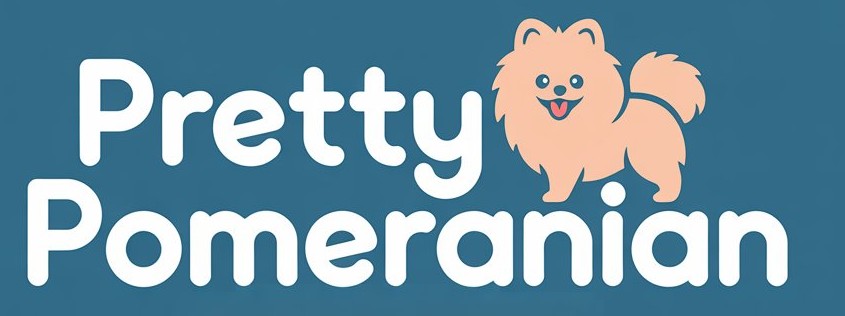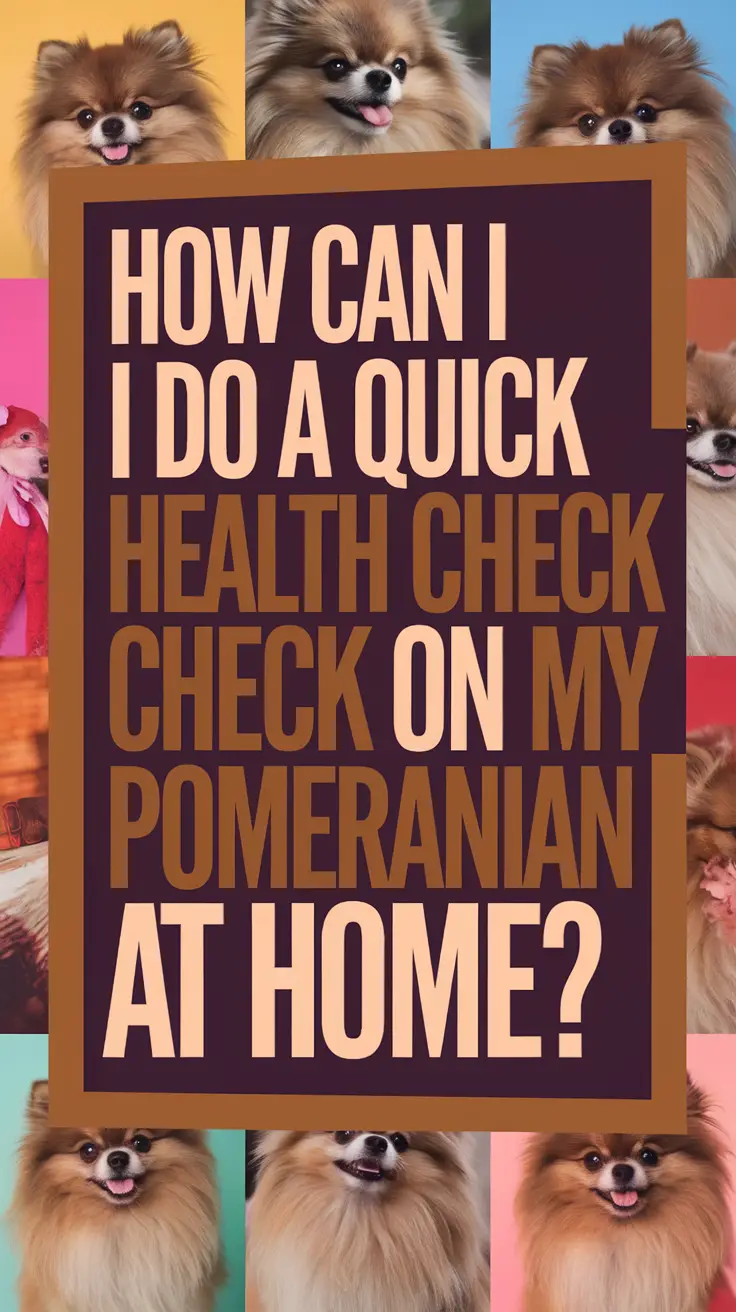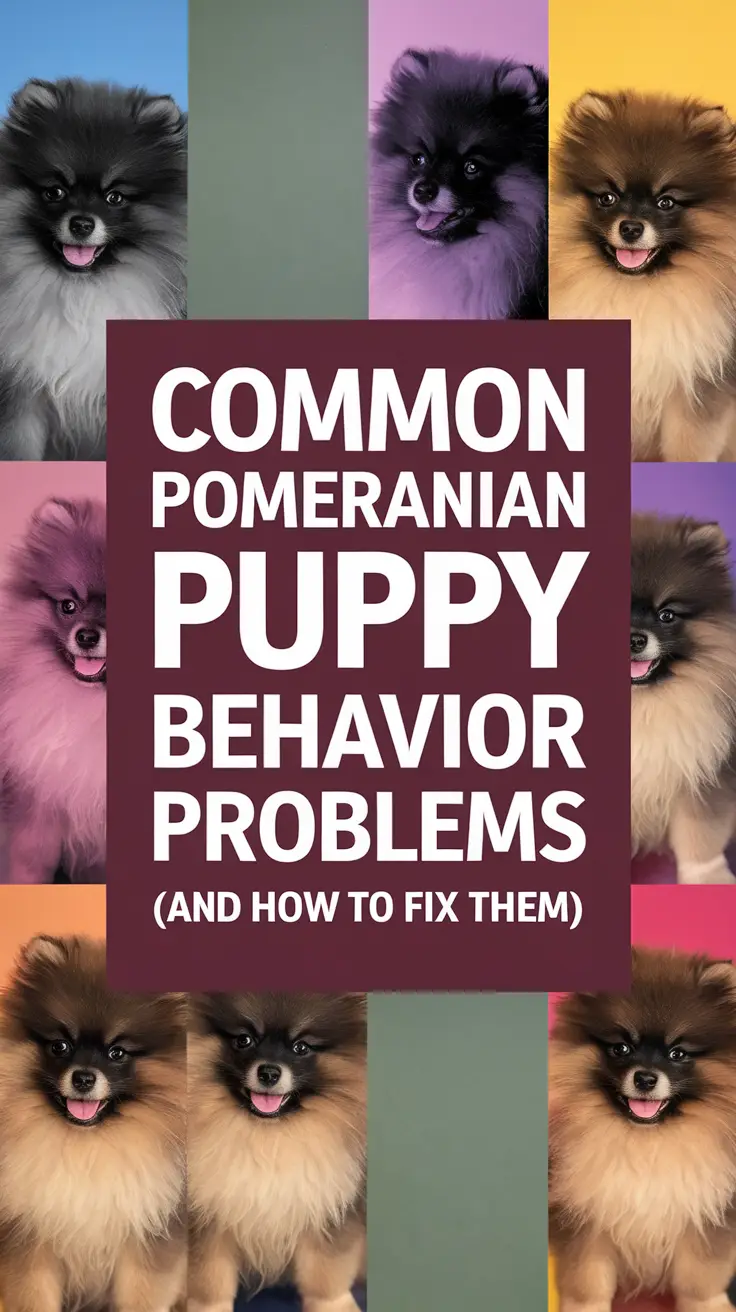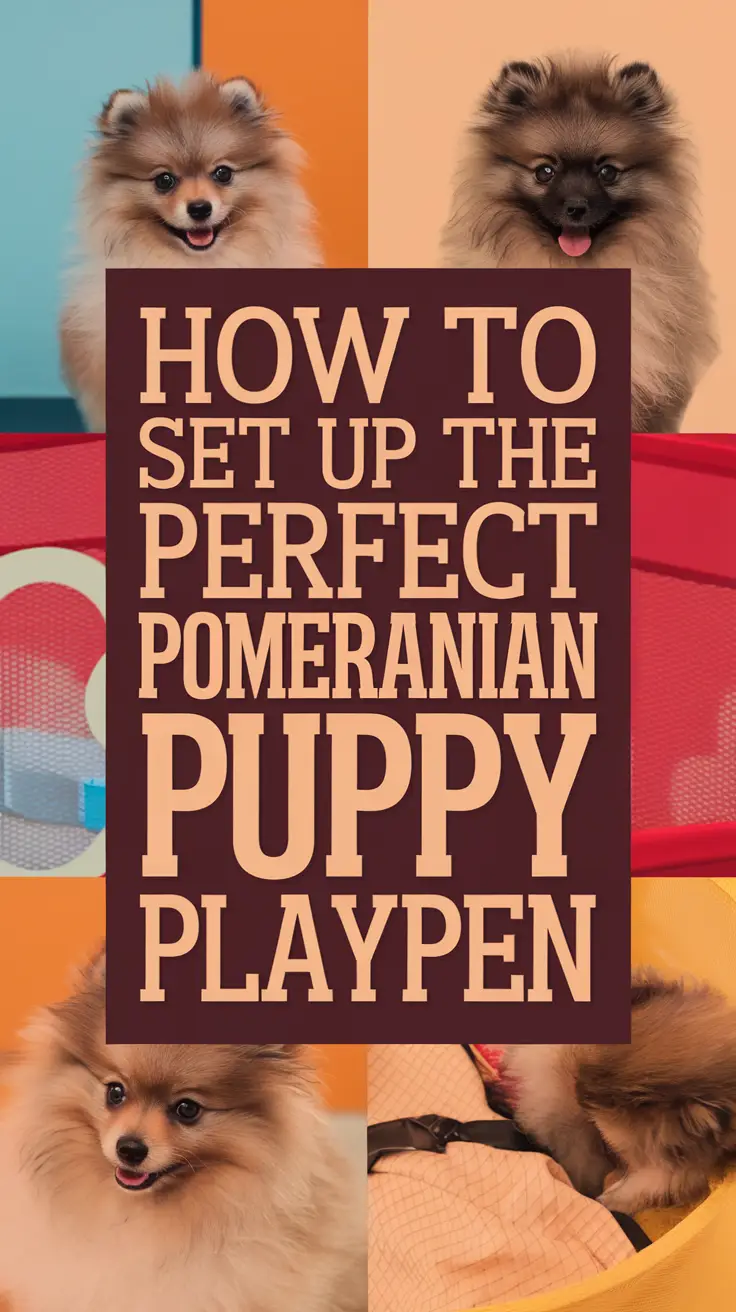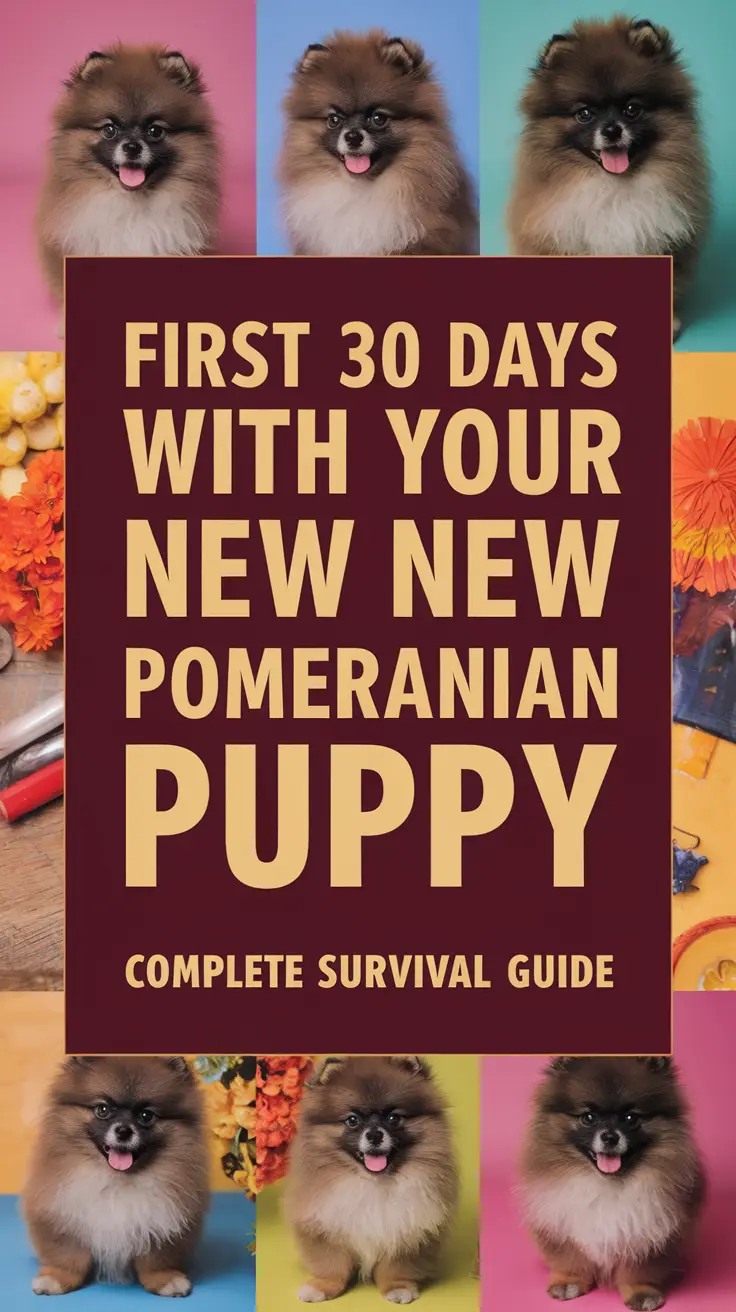Looking after your little Pom pup is all about nailing these five basics.
You’ll want to get their food routine right – go for good quality dry food and feed them 3-4 small meals a day when they’re tiny.
🐶 The best thing you can do for your new Pom puppy isn’t a cute sweater
👉 Get proper pet insurance while they’re young and premium rates are dirt cheap
Keep them clean with a nice puppy-safe shampoo every 3-6 weeks, and brush that fluffy coat every day.
When they hit 8 weeks, it’s time to start potty training – stick to a regular schedule and give lots of treats when they get it right.
Make sure they’ve got a cozy crate in a quiet spot where they can chill with their favorite toys and comfy bedding.
These little fluffballs need tons of sleep – like 18-20 hours a day – to grow up healthy and strong.
Let’s take a look at how to get all these things just right.
Setting Up Feeding Success
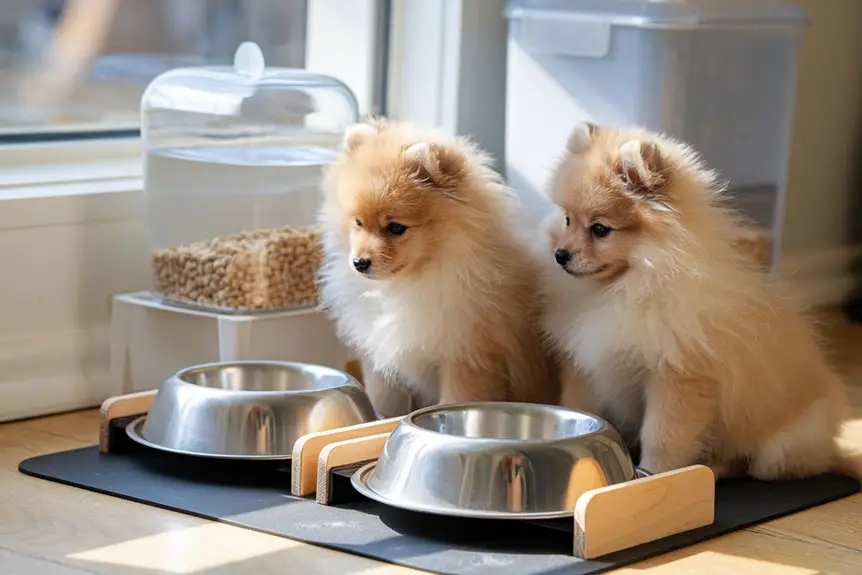
Just like any growing pup, your Pom needs the right food to stay healthy and strong. Get them some quality dry food made for small dogs, and make sure to spread out their meals during the day.
When your little fluff is 2-3 months old, give them about ¼ to ½ cup of food each day, split into 3-4 meals. Once they hit 6 months, you can switch to feeding them twice a day. Always keep their water bowl full, and keep an eye on their weight and energy to make sure you’re giving them the right amount.
Make sure to take your pup to the vet regularly – they’ll help you know if your feeding plan is working. Watch out for signs that tell you if you’re overfeeding or underfeeding, like being able to see their ribs or if they’re getting too chunky.
You can supplement their diet with safe fruits like apples without seeds, blueberries, and bananas for added nutrients and variety.
Bath Time Best Practices
Bathing your Pom doesn’t have to be complicated! You’ll want to give your pup a bath every 3-6 weeks, or whenever they get super messy. Just don’t go overboard with baths – washing too much can strip away the good oils from their fur and cause dry, itchy skin. Stick to gentle puppy shampoo that won’t irritate their sensitive skin, and make sure you rinse really well.
Here’s what you need for a good bath:
- Grab your stuff before you start – towels, shampoo, and a mat so they don’t slip around
- Rinse like crazy! Any soap left behind will make your pup super itchy
- Get them nice and dry with a towel and blow dryer so their fur doesn’t get all tangled
When they’re not getting baths, keep brushing your Pom’s fur regularly. This helps spread those natural oils around and gets rid of any dirt or debris stuck in there. Consider using a Groom Professional shampoo that contains natural ingredients to deep-clean while promoting healthy hair growth.
Mastering Potty Training
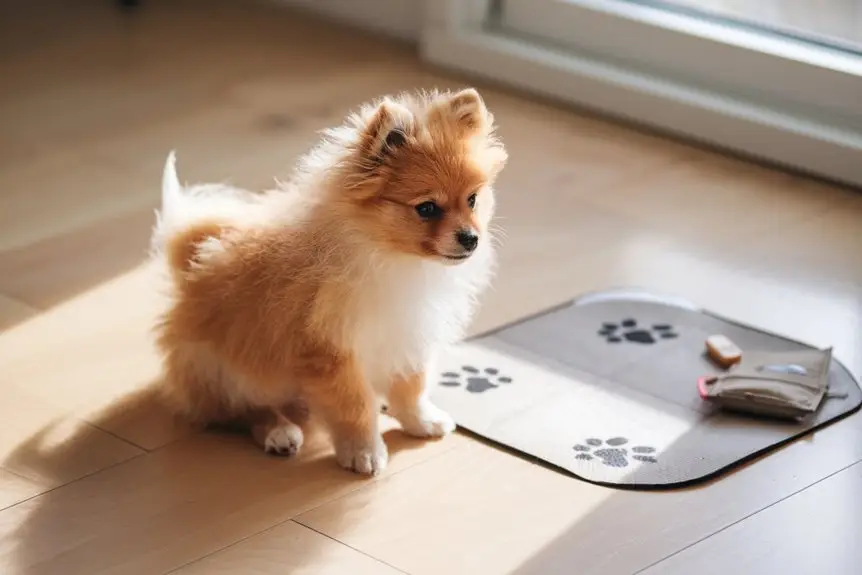
Want to nail potty training with your Pom? Let’s dive in! You’ll want to kick things off when your pup hits 8 weeks old and stick to a solid routine from day one. Just take your little fluffball to their special potty spot after they eat, wake up, or finish playing.
Keep an eye out for the classic “gotta go” moves – your pup might start walking in circles, getting super sniff-happy, or making those little whiny sounds. When they do their business in the right spot, shower them with love and treats right away! Don’t hold off on the goodies – your Pom needs to connect doing their business with getting rewarded.
Make mealtimes regular so you can guess when they’ll need to go, and remember – most puppies need a potty break about 15-30 minutes after chowing down. Just stay on track and keep your cool – your pup will get the hang of it! Setting up child gates throughout your home can help prevent accidents by keeping your Pomeranian confined to supervised areas during the training process.
Smart Crate Training Strategies
Crate training your Pom pup is super simple when you get the setup right. Grab a wire crate with a divider you can adjust as your tiny friend grows – they just need enough room to stand up, spin around, and flop down for a nap. Think of it as making a cozy little hideout that your pup will totally love hanging out in.
- Toss in some comfy, washable blankets and their favorite toys to make it super welcoming
- Put the crate somewhere quiet but not too far from the family action
- Don’t ever use it for time-outs or punishment – it needs to be your pup’s special spot
Take it easy when you start getting your Pom used to their crate. Give them lots of yummy treats and belly rubs when they go in. Keep things fun and casual, and before you know it, your pup will see their crate as their own awesome little den where they can chill and feel safe. Using calming pheromone products can help your Pom feel more relaxed and secure in their new crate environment.
Sleep and Rest Guidelines
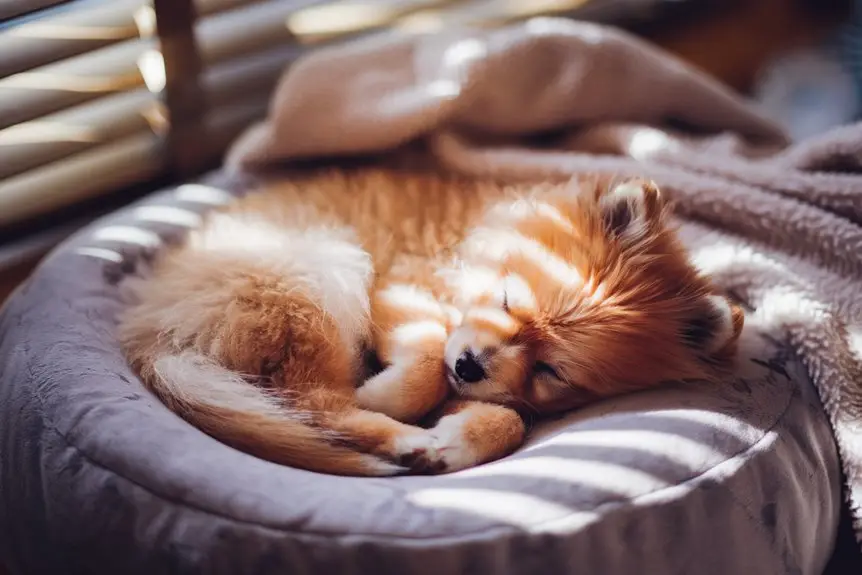
Your Pom pup needs tons of sleep – like 18-20 hours a day – to grow up healthy and strong! Just set up a cozy little spot that’s quiet and out of the way where they can crash. Grab some comfy bedding and toss in their favorite toy to make it feel like home.
Don’t stress if your little fluffball seems to be snoozing all the time – that’s just what puppies do, and it’s super important for them! As they get bigger, they won’t sleep quite as much. Between their nap sessions, you can teach them some basic commands with treats and praise. Just keep an eye out if they get cranky or start yawning a bunch – that’s your cue to let them catch some Z’s. Try to stick to the same sleep schedule each day to keep your pup happy and well-rested! Positive reinforcement training during their wakeful periods helps develop good behavior patterns.
Frequently Asked Questions
How Can I Stop My Pomeranian Puppy From Excessive Barking?
Hey, these little Poms can let out around 100 barks every hour – pretty wild, right? You’ll want to jump in and stop the barking with simple commands, give them treats when they’re being quiet, and keep them busy with fun toys so they don’t get bored and yappy.
When Is the Best Time to Start Socializing My Pomeranian Puppy?
Your Pom pup needs to meet new friends between 3-16 weeks – that’s the perfect time to get them out and about! During these weeks, they’re like little sponges, soaking up all kinds of new experiences. Let them hang out with different people, make furry friends, and check out new places. This is when they’re most open to all these new adventures, so don’t miss out on this window of opportunity!
What Exercise Routine Is Appropriate for My Growing Pomeranian Puppy?
Taking your Pom pup on short walks – like 15-20 minutes twice a day – is perfect to start with. As your little fluff ball gets bigger, you can make the walks longer. Let them play around inside too, but keep an eye on them so they don’t get too tired. Teaching them tricks isn’t just fun – it gets their brain working and counts as exercise too!
How Do I Prevent My Pomeranian Puppy From Developing Small Dog Syndrome?
Small dog syndrome can sneak up on ya, so start training right away! Keep things firm but fair with your little Pom – be the boss, give them treats when they behave, and get them hanging out with other dogs early on. Don’t let your tiny fluff ball think they’re in charge of everything, or you’ll end up with a bossy pup!
Which Toys Are Safest and Most Appropriate for Pomeranian Puppies?
Small, tough toys are your best bet for Pom puppies – think rubber chew toys, cuddly plush ones, and puppy Kongs. Just stay away from any toys with tiny pieces, strings, or stuff that’s too big for your little fluff ball’s mouth.
